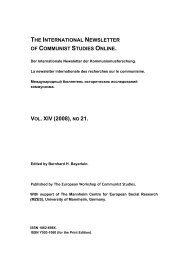11RXNdQ
11RXNdQ
11RXNdQ
Create successful ePaper yourself
Turn your PDF publications into a flip-book with our unique Google optimized e-Paper software.
Colonialism and Neocolonialism 2<br />
Cartier-Bresson’s photographs never gossip. They are not ideas; they give us ideas.<br />
Without doing so deliberately. His Chinese are disconcerting: most of them never look<br />
quite Chinese enough. Being a witty individual, the tourist asks himself how they manage<br />
to recognize each other. Personally, having looked through the album, I ask myself rather<br />
how we could confuse them, and classify them all under the same rubric. The idea of<br />
what is Chinese recedes and pales: it is no longer any more than a convenient label. What<br />
remain are human beings who resemble each other in that they are human beings – living<br />
presences of flesh and blood who have not yet been given their appellation contrôlée. We<br />
must be grateful to Cartier-Bresson for his nominalism.<br />
The picturesque takes refuge in words. If I present this old eunuch to you in words,<br />
what exoticism! He lives in the monastery, with other eunuchs. He carefully preserves his<br />
‘jewels’ in a jar. At the time when the Empress Tseu-hi, the yellow Agrippina, was still<br />
only a concubine, on certain evenings he would undress her, wrap her in a purple shawl<br />
and carry her in his arms to the imperial bed: naked empress, Agrippine concubine – it<br />
rhymes – purple shawl, all these words light each other up with their fire. What is missing<br />
is all that can be made visible, reality. Now open the album. What do you see first of all?<br />
A life which is coming apart, an old man. It is not his incidental castration, but universal<br />
old age which gives him that wrinkled, waxen face; it is old age and not China that has<br />
tanned his skin. He looks like a woman? Perhaps, but this is because the difference<br />
between the sexes tends to fade with age. He looks down sanctimoniously, slyly, and<br />
holds out his hand to grab the bank note shown to him by a cheerful, blasé interpreter.<br />
Where are the lights of the Imperial Court? Where are the empresses of yesteryear? So he<br />
is a eunuch: but what more could he do, at his age, if he were not? The picturesque is<br />
wiped away, farewell European poetry; what remains is the material truth, the poverty<br />
and greed of an old parasite of the fallen regime.<br />
This peasant is having lunch. He has come to the town to sell the produce of his land.<br />
At this moment he is eating rice soup, in the open air, in the midst of the townsfolk who<br />
ignore him, with the voracity of country people: famished, weary, solitary, he has<br />
brothers, at this very moment, in all the world’s large farming towns, from the Greek who<br />
drives his sheep along the boulevards of Athens to the Chleuh, who has come down from<br />
his mountains and is wandering through the streets of Marrakech. Here we have other<br />
peasants: hunger has brought them down to Peking and there they have stayed. What can<br />
they do in a capital without industry, when craft skills require a long apprenticeship?<br />
They will ride bicycle taxis. We have scarcely glanced at them, but these vehicles look<br />
familiar to us: we had our own during the Occupation. It is true that they seemed less<br />
filthy; that is because we put our filth elsewhere. And poverty is the best-distributed thing<br />
in the world: we are not short of wretched people. It is true that we are no longer in the<br />
habit of harnessing them to carriages to make them pull the rich. But have they, for all<br />
that, ceased to be our beasts of burden? We now harness them to machines.<br />
And who are the people who have themselves pulled along like this? Fine gentlemen in<br />
felt hats and long robes, the very men who at the moment are leafing through books on<br />
the shelves of a second-hand bookseller, and who are delighted that they are able to read.<br />
Do you laugh at their robes? Then you must laugh at our priests. At their hats? Then<br />
laugh at yourself. The uniform of the elite over there is a felt hat and a robe; in our<br />
country it is the suit. In any case, what is laughable, about them and about us, is that there




